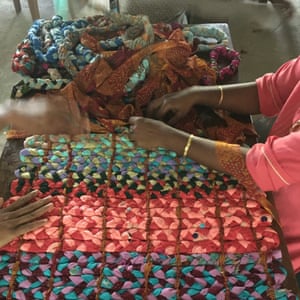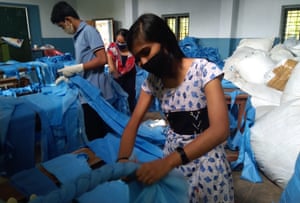At the height of the pandemic in the Indian state of Kerala, fashion designer Lakshmi Menon, 46, heard that every new Covid care centre had to have 50 beds. Mattresses were in short supply. Every time a patient was discharged, the mattress had to be incinerated. “I thought: that’s a lot of mattresses and a lot of burning,” says Menon.
Menon’s solution was to collect the mountains of plastic pieces from factories that make PPE – all the little bits left over after cutting. Women then braid the bits into rope-like plaits 6ft long. The braids are laid out in a zigzag and the ends tied together. The result is a light, soft, washable, hygienic mattress for just 300 rupees (GBP3) – half the price of a normal one.
The women of Arayankav near Kochi, where Menon lives on a rubber plantation, get jobs, the environment is protected and Covid clinics get mattresses – “shayya” in Sanskrit.

The idea of using waste scraps came to her when she was driving to Kochi in February and saw children sleeping on the road. A few days later, she visited a friend who runs a fashion house and saw heaps of waste fabric of different sizes.
“That’s when I thought I could use braiding to make mattresses for the homeless. Braiding allows you to use every single bit of fabric of different sizes. Even the tiniest bit can be incorporated and everyone knows how to tie a plait,” she says.
In March, she made 20 mattresses and handed them out to homeless families. Then lockdown happened. Her friends in design and fashion lost business overnight. Workers were laid off and things looked grim.
Menon forgot about the fabric mattresses, until she went to a friend’s tailoring unit in July and saw that he had started making PPE. In the corner lay a mountain of plastic pieces. Menon’s eyes gleamed.
“I picked them up and found they were cleaner, softer and more dust-free than fabric scraps. It was the best material I could have wished for,” she says.
Her friend was delighted when Menon took the scrap pieces. He had been struggling with how to dispose of them because burning was out of the question.
At the same time Kerala, overwhelmed by the pandemic, ordered the setting up of 50-bed Covid centres across the state and village councils scrambled to find enough mattresses.
Apart from the Covid centres that have bought them, Menon is working with NGOs to provide shayyas to homeless shelters and rough sleepers on the principle that “everyone deserves a good night’s sleep”. India’s 1.7 million homeless people normally sleep on the ground, usually on a thin mat.
Students in India who are part of Enactus, the international not-for-profit organisation set up by accountancy firm KPMG, are working on making the mattress widely available.
“We also feel that yoga centres might be interested in buying them as they are soft and light and easily rolled up,” says Ishartek Pabla, operations head of Enactus at Shaheed Sukhdev College of Business Studies.

Menon is unlikely to meet a shortage of raw material. India has become the world’s second-largest PPE manufacturer, with more than 1,000 manufacturers producing 4.5m pieces a day, the country’s textile ministry announced this week.
Menon’s shayya has been taken up by UN staff who will include it in a list of Covid innovative ideas that can be easily replicated.
Several Indian corporations have also contacted her. “These big companies have to fulfil their corporate social responsibility objectives and the mattress provides a good way of proving income for rural women in a sustainable way with no need for any equipment. Nothing really. Just a bit of space,” says Menon.
Sign up for the Global Dispatch newsletter – a fortnightly roundup of our top stories, recommended reads, and thoughts from our team on key development and human rights issues: